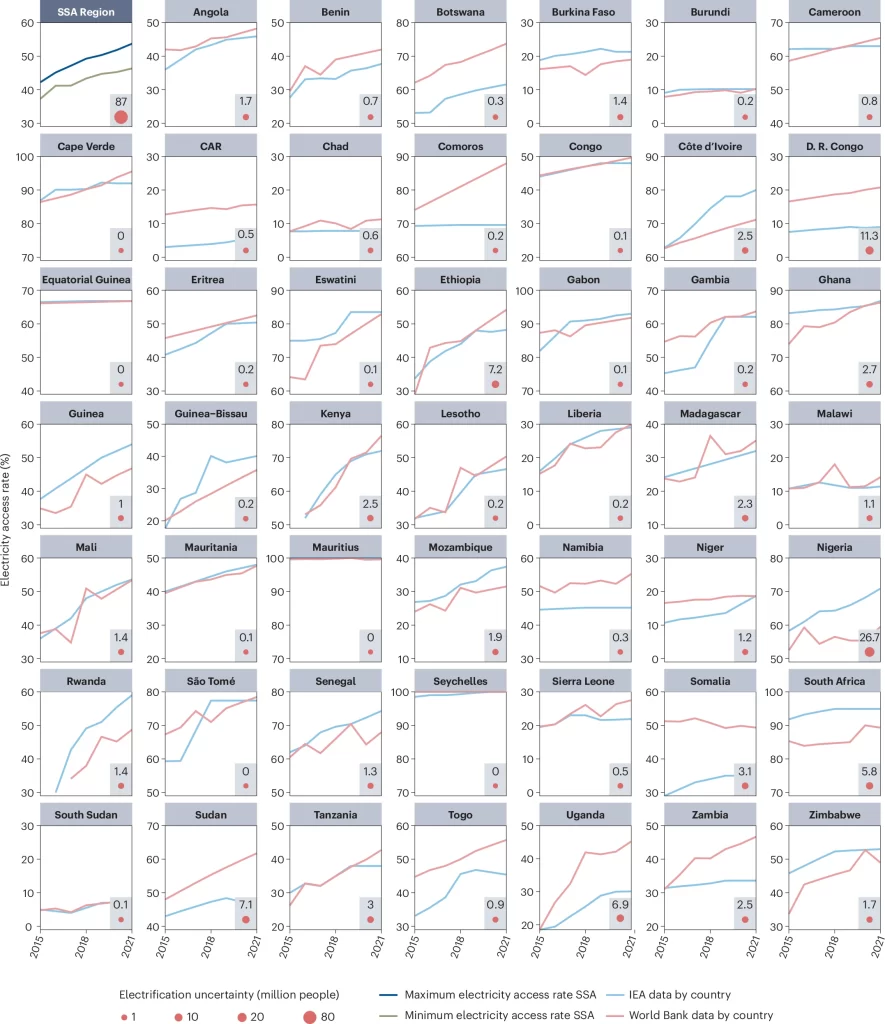Major Research Article published in Nature Energy calls for changes in the way we see Energy Access.
A CCG team of colleagues from the University of Oxford, Imperial, KTH, Wuppertal, UCL and the Technical University of Munich have produced research that puts a question mark against the accuracy of statistics that reflect people’s access to energy in sub-Saharan Africa.
Stephanie Hirmer, Julia Tomei, Pu Yang, Alycia Leonard, Philipp Trotter, Ariane Millot, Florian Egli, Koen van Dam, Agnese Beltramo and Martin Stringer all contributed to the paper “Inconsistent measurement calls into question progress on electrification in sub-Saharan Africa” which has just been published in Nature Energy.
Their research suggests that 87 million people in sub-Saharan Africa may not have access to electricity, despite being counted as such. That is almost half of total reported progress towards electrification in the region. The uncertainty is due to major discrepancies in data collection approaches by international organisations and our researchers are calling for standardisation in the methods used to measure what ‘counts’ as energy access in order to track progress more accurately in future. (Progress on energy access is measured because of SDG7, one of the Sustainable Development Goals set by the UN in 2015.)
Lead author, Professor Stephanie Hirmer explains: ‘If a village has a transformer, everyone in the village may be counted as having access to electricity – even if there is no physical connection to their home. We need an agreed standard of what ‘counts’ as access to electricity that can be updated over time to reflect the reality on the ground.
‘As a first step, agencies should provide explicit metadata documenting access definitions. Without these changes, the international community can’t track progress in a meaningful way: we’re left in the dark in more ways than one.’
The inaccurate data can affect how investments are directed and the siting of electricity infrastructure.

Fellow author, Koen van Dam, adds: “In the Climate Compatible Growth programme we want to support local development goals through demand-led research and building in-country capacity. However, without transparent data it is not possible to design the most effective policies and interventions, in this case to increase access to electricity across sub-Saharan Africa. “Imperial College London is a partner in CCG, with the Department of Chemical Engineering providing expertise in modelling and simulation as well as system design. That work typically relies on high quality data on the technical systems as well as the socio-demographic and economic context.
“The idea for this detailed mapping exercise came from an open discussion at our general meeting where we addressed the impact of using inconsistent data sources for electricity access and the challenges with tracking progress since the definitions used are not the same in each country. There was a lot of enthusiasm in the team to try to address this, so authors from seven different institutions worked closely together with the aim of identifying electricity access definitions and resulting data gaps.”
Martin Stringer of Imperial added “the range of nationalities and hence languages of CCG’s team were a really big asset to get this project going. It was great to realise when we sat down with this group at the meeting that between us, we spoke all the administrative languages in Africa and could therefore attempt to trace the trails of breadcrumbs linking the data from the nicely formatted data in the UN, World Bank and other places to the government surveys or other real sources in the different national languages.”
The paper was published in Nature Energy on 16 September and is available at https://www.nature.com/articles/s41560-024-01609-4.